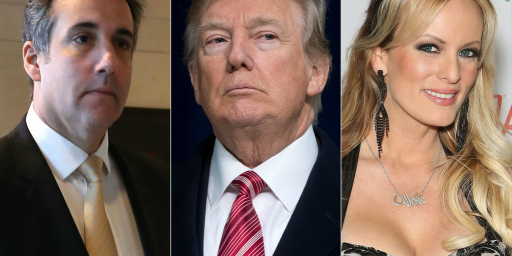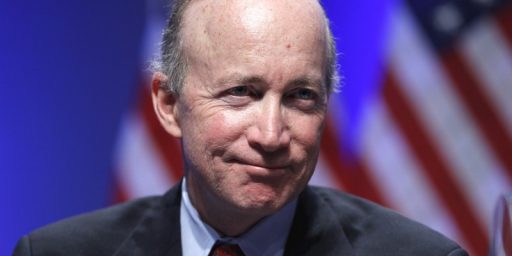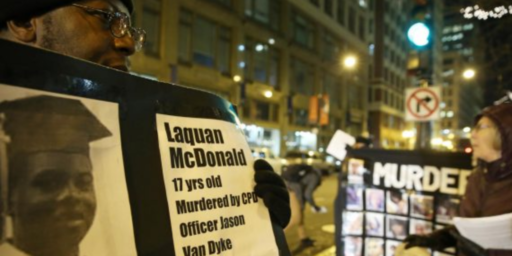Faith-Based Initiatives and Black Votes
When George W. Bush proposed faith-based initiatives upon entering office, many observers characterized the program as a move to solidify his social-conservative base. It obviously was, of course. But, as the Los Angeles Times reports, it also had the effect of broadening African-American support:
Bush Rewarded by Black Pastors’ Faith
Bishop Sedgwick Daniels, one of this city’s most prominent black pastors, supported Democrats in past presidential elections, backing Bill Clinton and Al Gore. This fall, however, the bishop’s broad face appeared on Republican Party fliers in the battleground state of Wisconsin, endorsing President Bush as the candidate who “shares our views.”
What changed? After Bush’s contested 2000 victory, Daniels felt the pull of a most powerful worldly force: a call from the White House. He conferred with top administration officials and had a visit in 2002 from the president himself. His church later received $1.5 million in federal funds through Bush’s initiative to support faith-based social services. Daniels’ political conversion, and similar transformations by black pastors across the nation, form a little-known chapter in the playbook of Bush’s 2004 reelection campaign — and may mark the beginning of a political realignment long sought by senior White House advisor Karl Rove and other GOP strategists.
Here’s the problematic part for the opposition:
Black religious leaders who backed Kerry said that, in Florida in particular, they had trouble recruiting fellow ministers to get out the vote for Democrats, despite simmering anger in the black community there over the disputed 2000 election. The Atlanta Rev. McDonald, who heads the Democratic-leaning African American Ministers Leadership Council, said that faith-based money played a part. “We had a real hard time organizing ministers in Florida, harder in 2004 than in 2000, because more money had been circulated,” McDonald said. “They just weren’t showing up at the meetings anymore.”
If Republicans get their way, it will be even harder in 2006. Already, they are laying intricate plans to encourage greater black migration to the GOP. As he prepares to step down this week as chairman of the Republican National Committee, Ed Gillespie says he will stay on as a consultant to the party specifically to recruit black voters. He predicts the GOP presidential nominee could win 30% of that constituency in 2008.
That prediction seems too high to me. Also, I should note that the Times depends primarily on basic statistics and anecdotes, not systematic examinations of faith-based initiatives. Though I can buy the general trend sketched out in the report, it would be nice if a social scientist actually tested the hypothesis.
Tangentially, I find this point disturbing:
Administration record-keeping has made it difficult to track where the faith-based money has gone. Data released last month by the White House, for example, indicate that more than $1 billion was distributed through faith-based programs in 2003. But the summary includes a caveat that it does not represent all grants, and it includes numerous grants to agencies that are actually secular and other groups that were receiving funds long before Bush entered office.
The potential for abuse is particularly troublesome since constitutional questions already surround the program. From a political standpoint, Republicans could find their outreach efforts hindered by perceptions of foul play. The administration ought to get its records in order.





They should defninitely get their records in order. This is one place where I don’t follow what I would expect to be the classic Democratic response. My major concern about faith-based programs is that the churches and other religious organizations would begin to alter their message and mission to appeal to the government program, rather than the other way around. But the reality is that, for instance, in many inner city neighborhoods, the church is the one entity that’s been there, is trusted, and has the connections to be effective. And they shouldn’t be ineligible for government funding just because they’re a church and not a storefront non-profit.
Is non faith based money better reported? What is the standard of comparison for tracking the money. Perhaps they should do a better job tracking money, but if this is the same across the board, it is a general government problem, not a problem with faith based programs.
Also, what is so frightening about faith based rather then secular? I would argue both are religions, and both tend to have their own agendas, when you know go into a religios setting you know what their message is. As long as the group is doing what they say they are, and are within government guidelines, they should be allowed to do their work.
Harry: I agree. And I share your concern about faith-based programs undergoing changes simply to attract funding.
Anna: I’m unsure whether the faith-based programs are any better or worse than non-faith-based ones in terms of reporting. In all cases, I obviously think it should be in order. Given the high political scrutiny that the faith-based are under, the administration would be wise to give it additional attention.
In spite of the fact that I am a staunch conservative (perhaps I should say because I am a staunch conservative?) I am very much opposed to the faith-based initiatives. Cut Federal spending and taxes, and trust the people to voluntarily give generously to the charity of their choice.
This approach completely avoids some very legitimate Constitutional issues, and it also avoids the danger of corrupting the churches themselves. My own church, famous for its conservatism, has nonetheless refused to seek faith-based initiative money to fund its social programs because of the fear of being compromised.
“That prediction seems too high to me.”
It sounds too high to me, too; a 30% share of the AA vote would have the same effect on the Democratic Party as a stake through the heart would have on… I was about to say, ‘a vampire’, but when it comes down to it one of those would ruin my day.
I think any money the government hands out to any charity-faith based or not should be carefully followed-there is always a huge potential for abuse and mismanagement.
I am torn on the issue of faith based initiatives. On one hand, some religious charities are the only ones that will touch certain parts of the country, but on the other I worry that what makes a charity unique and able to reach its target may be compromised, if they change the program to suit the state funding rules. I don’t know, just seems that whenever the government gets its hands in something-it often does a good job of only making it worse.
As for the 30% of the AA vote, I don’t see it coming in 2008. I do think the DNC, if it doesn’t stop taking AA’s for granted, and doesn’t stap seeming to be so hostile to religious and moral issues (AA’s are actually pretty religious and pretty morally conservative) that they will steadily lose AA votes. Although, that trickle I think will be much slower-at best I would think 15% of AA would vote for GOP in ’08, and that has a lot to do with who is running on either parties ticket.
A ministry that would take faith based money from any administration is an abomination. It would be nothing short of Judas and his 30 pieces of silver. The existance of the church that professess Christ as it’s head, maintains it’s existance through the giving of it’s members, inspired by the faith and leading of it’s minister. The minister ordained to preach and spread the word of God and the salvation through our Lord Jesus Christ, is to do just that!
If you already know from whence your help comes, what place will faith have in the church!
Ministers as well as members , will be paying more attention to political outcomes than prayer.
We who know the word, must remember, that the Government was put in place by God, but not ordained to carry out the will of God!
Churches will grow to the very limits of this government offering. It will become accustom to it. There will be corruption in it’s ranks. It being taxpayer money, the church will have to make an accounting to government. The government will have to regulate it’s books, thereby controlling the churches business , if it wants to keep recieving the help. The church would then be politically purchased.
I can already see the potential. I beg to tender this thought. When I see ministers preaching week after week to a football field of followers, what need would he have for government assistance? I don’t question the ministry. My statement is, Has God shown that he can and will take care of his own house! He is God!
If the Government has the money to help, why can’t the government just legislate it into law. I feel a major mistake taking place with this initiative. The fall out could be catistrophic!
I truly pray the all ministers believing in Jesus Christ as our Lord, would seriously search the scripture and pray for guidance. God is a jealous God! I see this offering as an idol, because it did not require faith. Only loyalty!
Nothing is free. Those that take, will be asked for something in return! That you can be assured!
Takers beware of the web you weave.